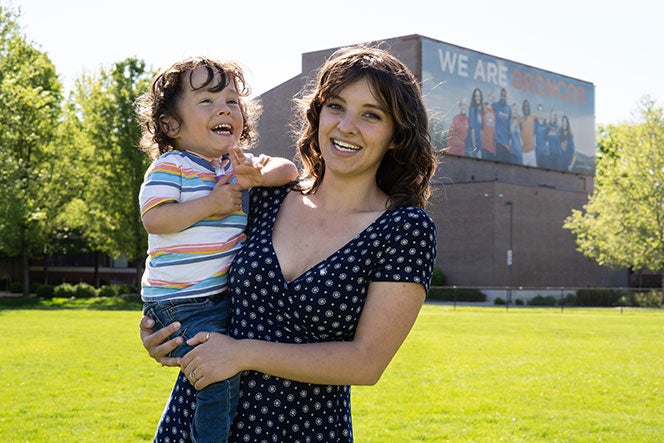When the Center for the Study of Aging launched the Family Caregiver Navigator program in Spring 2020, Sarah Toevs, professor of public health and population science and director for the Center for the Study of Aging, knew starting a pilot project at the onset of a global pandemic would be a challenge. But she also knew it would be a time that, according to the Idaho Caregiver Alliance, the 306,000 informal family caregivers in Idaho would need more support than ever. What she didn’t know was that Master of Social Work students would become the superpower of the program.

“The delivery of the Family Caregiver Navigator project would not be possible without the engagement of social work students and support from their faculty” she said.
Now in its second year having served over 300 caregivers, the Family Caregiver Navigator program’s goal is to provide individualized support, systems navigation and care planning with a focus on the caregiver – not the patient or individual with a diagnosis. By supporting caregivers and preventing the stress that leads to burnout, the program hopes to support the wellbeing of the entire family or social unit.
Focusing on the wellbeing of the caregiver is a perspective shift that is a challenge in a culture that takes unpaid caregivers for granted and renders them invisible. That’s where social work students come in, providing an unprecedented level of support to caregivers in Idaho.
Emma Ballantyne, a Master of Social Work student in her final year, knows what it’s like to be a caregiver as the parent to a medically complex child. The challenges of navigating her son’s medical needs as a young parent is what motivated her to become a social worker and join the caregiver navigator program. She anticipates becoming a caregiver to her parents someday and accepts that as a fact of life.

“It is just something that we will all eventually need or carry out one day that no one really knows ‘how’ to do,” Ballantyne explained. However, she’s motivated to help individuals prioritize their self-care and mental health which is critical to delivering the best care possible.
Sandra Zuidema and Ana Villanueva are also Master of Social Work students who take pride in supporting caregivers because of the experiences they’ve had with their families. “Being the oldest of five siblings in an immigrant family placed a lot of pressure and expectations on me. I was my family’s advocate from a young age and still continue to fill that role as an adult,” Zuidema said. “I’ve had to care for my own siblings and grandparents. Culturally it’s an expectation, but I wanted to start normalizing asking for help.”

Zuidema and Villanueva are bilingual in English and Spanish and specialize in supporting LatinX caregivers. Nationally, according to AARP, LatinX caregivers are more likely to care for someone in the home and more likely to face financial challenges, not to mention the language barrier which often prevents people from accessing services in the first place. While Spanish-language resources for caregivers are extremely limited in Idaho, just having access to a bilingual person who can counsel them on their options can be immensely helpful.
In fact, all three navigators cited the limited availability of resources for caregivers as one of the most difficult parts of their job. The social services and community-based organizations that do exist tend to be concentrated in Southwest Idaho and creativity is required to connect rural caregivers with support.
Ultimately, the social work students feel this internship is excellent preparation for their future careers. “Being part of the Family Caregiver Navigator team provides a foundation for social work,” Zuidema said. “It has also allowed me to build relationships with the community and familiarize myself with caregiver policies [in the state].”
Ballantyne added, “This work has really provided the microlens of working with individual clients but I also get a macro perspective. Working with community partners and leveraging resources with them to help this population is a skill that takes time and effort to build.”
Thankfully, the social work Interns’ contribution will extend well beyond their internship. The resources they identify and the relationships they build are captured in a database and online resource library that will continue to serve caregivers in the program moving forward.
Governor Brad Little recently recognized November as National Family Caregiver month. If you are a caregiver or know one in your life who needs support, contact Family Caregiver Navigator today at 208-426-5899 or on their website, also available in Spanish.
By Chelsea Smith, communications and project coordinator for the Center for the Study of Aging